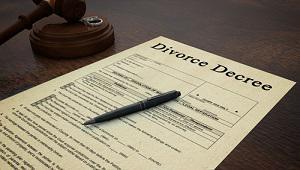Illinois Divorce and Common Law Marriage
 The only way for two spouses to end their marriage is by getting a divorce. But, what many people do not realize is that common law marriages also require a divorce before either spouse is free to marry someone else. How do you know if you have a common law marriage?
The only way for two spouses to end their marriage is by getting a divorce. But, what many people do not realize is that common law marriages also require a divorce before either spouse is free to marry someone else. How do you know if you have a common law marriage?
Illinois and Common Law Marriage
The state of Illinois does not recognize common law marriage. The only way to get married in Illinois is to obtain a marriage license and have a legal ceremony. Common law marriage, however, is recognized in many other states.
In states with common law marriage, a couple is considered to be legally married when they hold themselves out to be married and have lived together for a certain amount of time. Each state is permitted to create its own requirements regarding exactly what constitutes such a marriage. Some, like Illinois, have no criteria under which a common law marriage is assumed to exist.
While Illinois does not have a common law marriage provision, it does recognize common law marriages established in other states. If you think you might have a common law marriage from another state you would need to check with a family law lawyer to explore all the issues you may be facing.
When You Need a Divorce in Illinois
While some states have common law marriages, there is no such thing as a common law divorce in any state. If you met all the requirements for a common law marriage in another state and then moved to Illinois, you would need to get a divorce before getting married to another person. It is illegal in Illinois to be married to more than one person at a time. It is called bigamy.
If you have lived in Illinois for at least 90 days, you could qualify for a divorce in Illinois.
Filing for Divorce After a Common Law Marriage
Filing for divorce from a common law marriage recognized by another state requires a bit more effort than a typical divorce. You will first have to prove to the court you were legally married in another state. Once you have done that, the court will have the power to hear your case like any other divorce case. The court will decide on how property should be split and if anyone should be required to pay child or spousal support, and it will also decide any parenting time issues.
If you have any questions about divorce, legal separation, or any other family law issues, contact an experienced DuPage County divorce lawyer. At the Law Office of Matthew M. Williams, P.C., our team is equipped to help you explore your legal options and find the solution that works best for your situation. Call 630-409-8184to schedule your initial consultation today.
Source:
http://www.ilga.gov/legislation/ilcs/ilcs4.asp?DocName=075000050HPt%2E+IV&ActID=2086&ChapterID=59&SeqStart=3800000&SeqEnd=5300000








